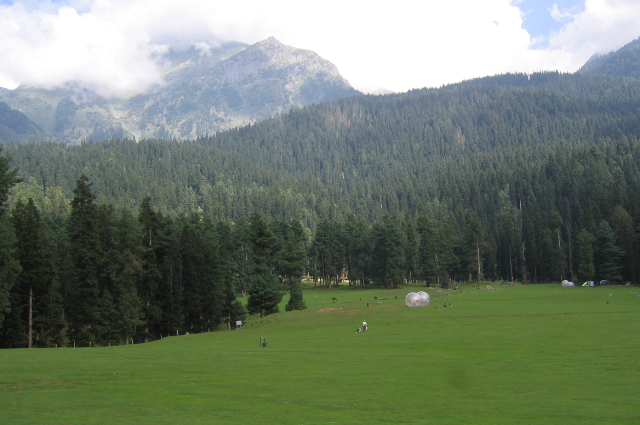Nestled along the banks of the Lidder River, Pahalgam is a small town in the Anantnag district of Jammu and Kashmir, India. Known as the "Valley of Shepherds," its name comes from "Puhal" (shepherd) and "Gam" (village). Surrounded by lush meadows, dense pine forests, and tall mountains, Pahalgam has always been a peaceful retreat — a place where life felt simple and beautiful.
Each year, thousands of travellers visit Pahalgam to enjoy its natural beauty, walk through its meadows, and find spiritual peace on the way to the sacred Amarnath Shrine. Pahalgam was not just a town; it was a living story where every stone, tree, and breeze had something to share.
But even the calmest places are not safe from tragedy. One dark day, Pahalgam witnessed an attack that left deep scars on its people and land.
Background: What Happened at Pahalgam?
On a quiet day, gunmen opened fire on tourists gathered in a meadow in the Baisaran Valley, near Pahalgam. This attack was one of the worst assaults on civilians in the region in recent years, claiming at least 26 lives and injuring many others. Most of the victims were travellers who had come to experience the beauty and peace of Pahalgam.
The violence struck without warning in an area only accessible on foot or horseback. Survivors described the horror of the sudden attack as families sought shelter and tried to protect one another. In the aftermath, grief, fear, and shock spread not just across the region but across the entire nation.
Yet, even as fear spread, something beautiful began to rise — the strength and kindness of the human spirit.
The Emotional Impact: A Nation in Mourning
The pain of the Pahalgam Attack was felt far beyond the town itself.
Families waited helplessly for news of their loved ones. Hospitals were crowded not just with the injured but also with volunteers ready to donate blood, medicines, and their time. Strangers hugged each other at funerals, sharing a grief that united everyone, no matter their background or language.
The sadness was heavy, but the sense of unity was stronger. For every tear that fell, there was a hand to wipe it away. For every moment of silence, there was someone offering comfort.
It reminded us that when disaster strikes, we come together. We lean on each other. We become one.
Stories of Humanity and Strength
Amidst the chaos, the true spirit of humanity shone through. Residents of Pahalgam and nearby villages acted selflessly to help the victims.
Abdul Waheed, a local resident, rushed to the site with his pony to help carry the injured back down the valley to areas accessible by vehicles. He was not alone; members of the local pony association quickly joined, using makeshift cots and ponies to bring the wounded to safety.
People opened their homes to provide shelter. Food, blankets, and first aid were shared freely among survivors. Even as fear and sorrow overwhelmed the community, the spirit of kindness, bravery, and solidarity stood firm.
No one cared about religion, caste, or class. In moments like these, everyone is simply human. Everyone becomes family.
These small acts of love and courage shine as a bright light even in the darkest times. They show that while violence can cause pain, it can never defeat compassion.
A Personal Reflection: What Pahalgam Taught Us
Witnessing the aftermath, I realized the attack was not just a story of pain — it was a story of strength, compassion, and hope.
Yes, it showed how fragile peace can be. But more importantly, it reminded us that kindness is stronger than hatred, and community is stronger than fear.
Evil can break walls and hearts, but it can never defeat our spirit.
Such cowardly acts may wound us deeply, but they can never defeat us.
They may spill our blood, but they can never break our courage, our unity, or our spirit.
Our courage stands taller than fear. Our unity shines brighter than any darkness that hatred can spread.
In the faces of the helpers, the prayers whispered in hospital corridors, and the hands that reached out to strangers without thinking twice — I saw something stronger than violence.
I saw hope.
The attack on Pahalgam did not just attempt to destroy lives. It tried to shake our very belief in humanity — but it failed.
If anything, it renewed our faith in kindness, bravery, and compassion. It reminded us that when we are tested, we rise stronger.
In the end, we will not remember only the sadness.
We will remember the silent promises made that day — to live with more kindness, to love harder, to protect one another without hesitation.
We will remember that pain can unite just as powerfully as joy.
Pahalgam taught us that true strength is not in returning hatred with hatred, but in answering hatred with humanity.
It taught us that no matter how hard someone tries to divide us, we will stand together, unbroken, undefeated, and unafraid.
Conclusion: Choosing Humanity Over Hate
The Pahalgam Attack left deep scars. But it also left important lessons that we must carry forward.
Hatred can destroy in a second, but healing takes time, patience, and kindness.
We must honour the victims not just by remembering them, but by choosing to live with more compassion, speaking against violence, and building understanding between people.
The future needs us to stay kind, to stay strong, and to never let grief harden our hearts.
Pahalgam showed us the darkest side of humanity — but also its brightest. It is now up to us to keep that light alive.
In memory of those we lost. In honour of those who chose to heal.

